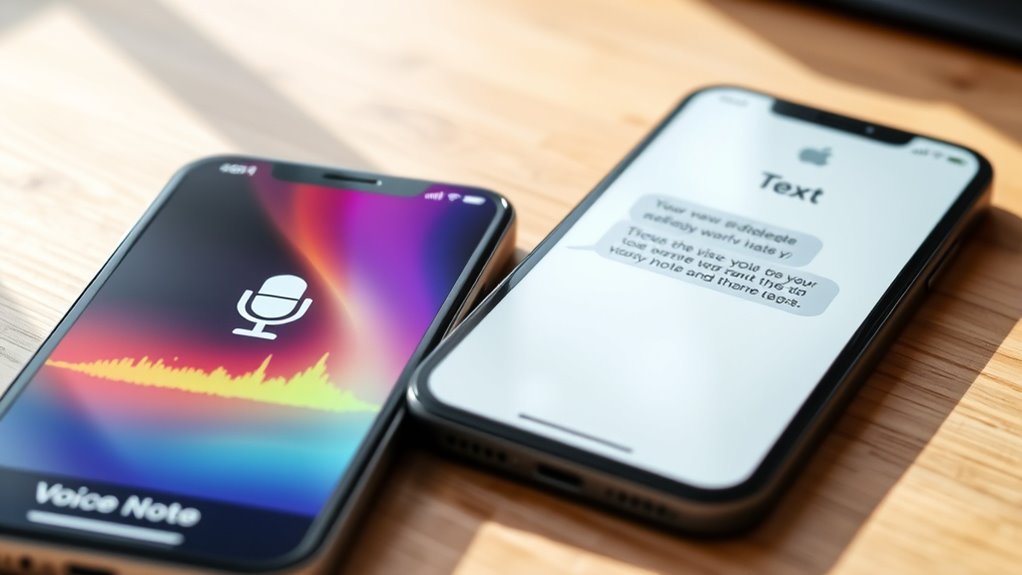Voice notes help you build emotional connections faster because they convey tone, spontaneity, and subtle cues that text often misses. You can express emotions more naturally, making your conversations feel more authentic and intimate. They also encourage quicker responses, maintaining the flow and closeness. While texts are thoughtful, voice notes deepen the sense of presence and immediacy. Keep going to discover how choosing the right method enhances your relationships even more.
Key Takeaways
- Voice notes convey emotions through tone and intonation, fostering quicker emotional connection than written texts.
- They enable faster responses, maintaining conversational flow and increasing perceived closeness.
- Subtle emotional cues like warmth or sarcasm are clearer in voice notes, reducing misunderstandings.
- Voice messages support more spontaneous, natural interactions, strengthening bonds promptly.
- Audio quality enhances emotional clarity, making voice notes more effective for quick, meaningful connections.

In today’s fast-paced world, choosing between voice notes and texts can substantially impact how effectively you communicate. When it comes to building connection, the emotional tone you convey plays a vital role, and your response speed often signals your level of engagement. Voice notes let you express emotions more naturally, allowing your tone of voice, intonation, and pauses to come through clearly. This creates a sense of intimacy that written texts often struggle to match. When someone sends you a voice note, you can immediately pick up on their mood—whether they sound excited, concerned, or relaxed—which helps you connect on a deeper level. Your response speed also matters here; replying quickly to a voice note shows you’re attentive and keen to engage, reinforcing the emotional connection. Conversely, when you send a text, the emotional tone can be harder to interpret, and recipients might miss subtle cues like sarcasm or warmth, leading to misunderstandings. Texts tend to be more neutral, which can sometimes hinder emotional connection, especially if the message is complex or sensitive.
However, response speed plays differently in the two formats. With texts, you often have the luxury of time—people appreciate thoughtful, well-phrased replies, and taking a moment to craft your message can prevent miscommunication. But this can also create delays that may weaken the feeling of immediacy and intimacy. Voice notes, on the other hand, tend to generate faster responses because they’re more spontaneous and conversational. When you hear someone’s voice, you’re more likely to respond promptly, maintaining the flow of communication. This immediacy fosters a stronger emotional connection since both parties feel more present and engaged. Additionally, the audio quality of voice notes plays a crucial role in ensuring the emotion is conveyed clearly, which further enhances connection.
Frequently Asked Questions
Do Voice Notes Convey Emotions Better Than Texts?
You might find that voice notes convey emotions better than texts because they offer tone clarity and emotional depth. When you speak, your intonation, pitch, and pace reveal feelings more naturally, helping your listener understand your true intent. Texts can sometimes miss these nuances, making it harder to interpret emotions. Voice notes bring your message to life, fostering a stronger, more genuine connection through the richness of your voice.
Are Voice Notes More Private Than Written Messages?
Did you know that 63% of people worry about privacy concerns when messaging? Voice notes can feel more private because they’re harder to screenshot or copy, enhancing message security. However, they also raise privacy concerns if someone overhears or records them. Texts are easier to delete and control, but voice notes often feel more personal, making them seem more private for emotional conversations. Ultimately, it depends on your privacy priorities.
How Do Voice Notes Affect Communication Speed?
Voice notes speed up communication by providing tone enhancement, allowing you to express emotions more clearly than plain texts. They’re convenient factors that save time, as you can convey complex messages quickly without typing. Your tone and intent come through naturally, reducing misunderstandings. Overall, voice notes make conversations more efficient and genuine, helping you connect faster by combining quick delivery with richer emotional context.
Can Voice Notes Replace Face-To-Face Conversations Effectively?
You might wonder if voice notes can replace face-to-face conversations effectively. While they add a conversational tone and convey emotions better than texts, they lack non-verbal cues like facial expressions and gestures. This makes it harder to fully interpret tone and intent. Voice notes can bridge some gaps, but for deeper connection, face-to-face chats remain unmatched. They foster richer understanding through both verbal and non-verbal cues.
Do Voice Notes Encourage More Honest Responses?
Think of voice notes as a window into someone’s soul. They often encourage more honest responses because they foster emotional authenticity and response transparency. When you hear tone and nuance, you’re more likely to connect genuinely. Unlike plain texts, voice notes let you feel the person’s true emotions, making it easier to share openly. This depth can bridge gaps faster, creating a stronger, more authentic connection.
Conclusion
So, which really builds connection faster: voice notes or texts? It all depends on what feels more genuine to you. Voice notes add emotion and tone that texts often miss, making your messages more personal. But texts are quick and convenient. Isn’t it about quality over speed? Whether you choose voice or text, the key is to be authentic and intentional. After all, isn’t connection what truly matters in every conversation?










